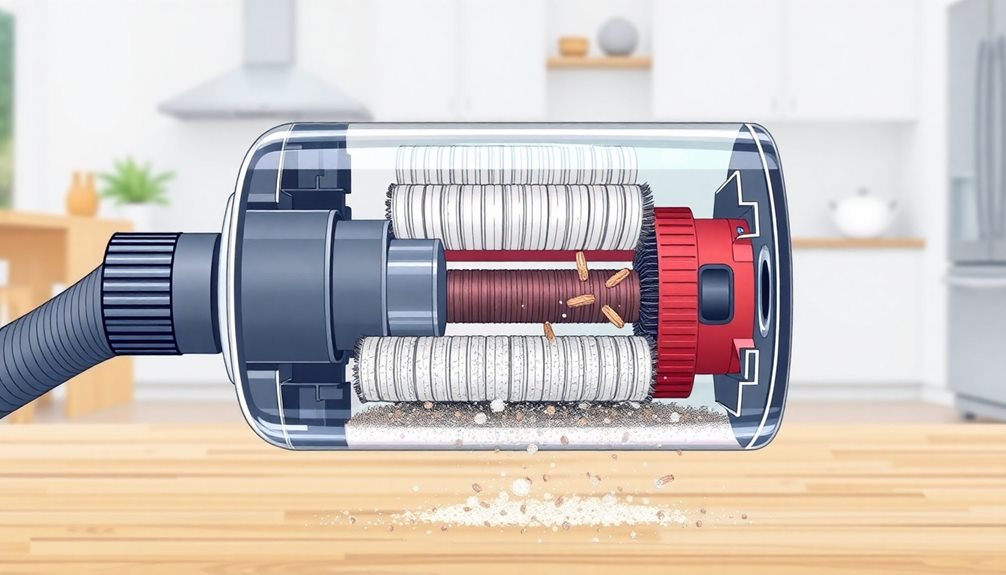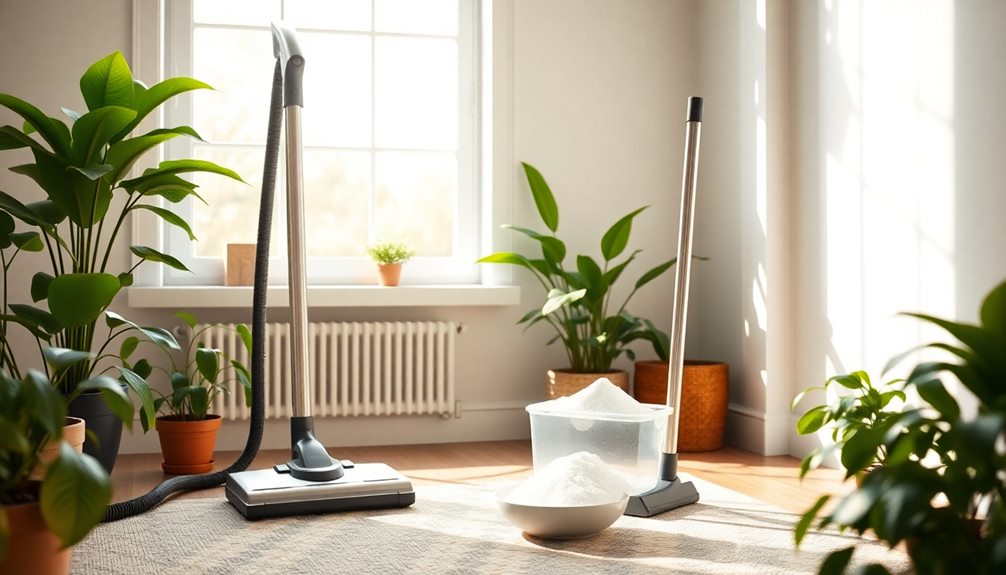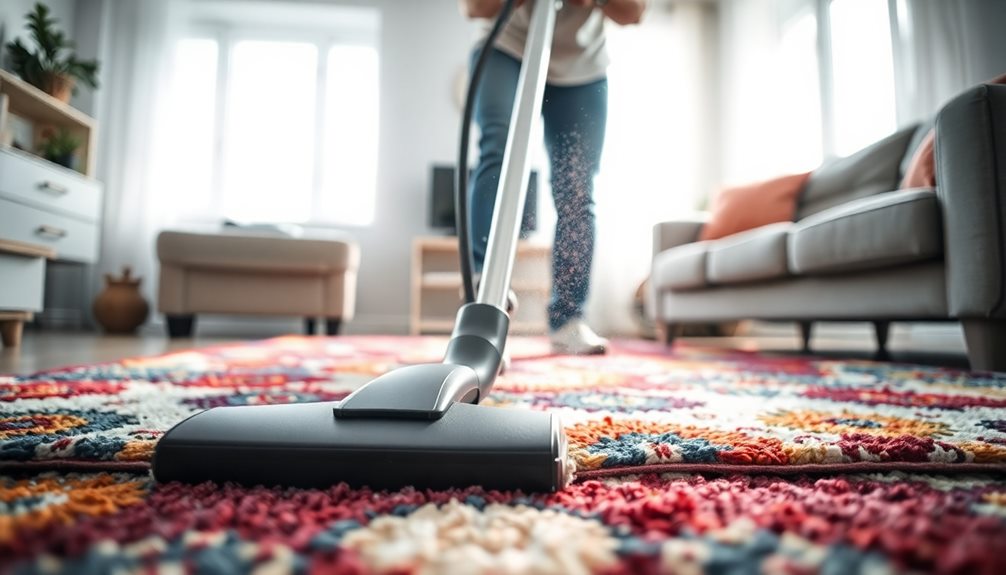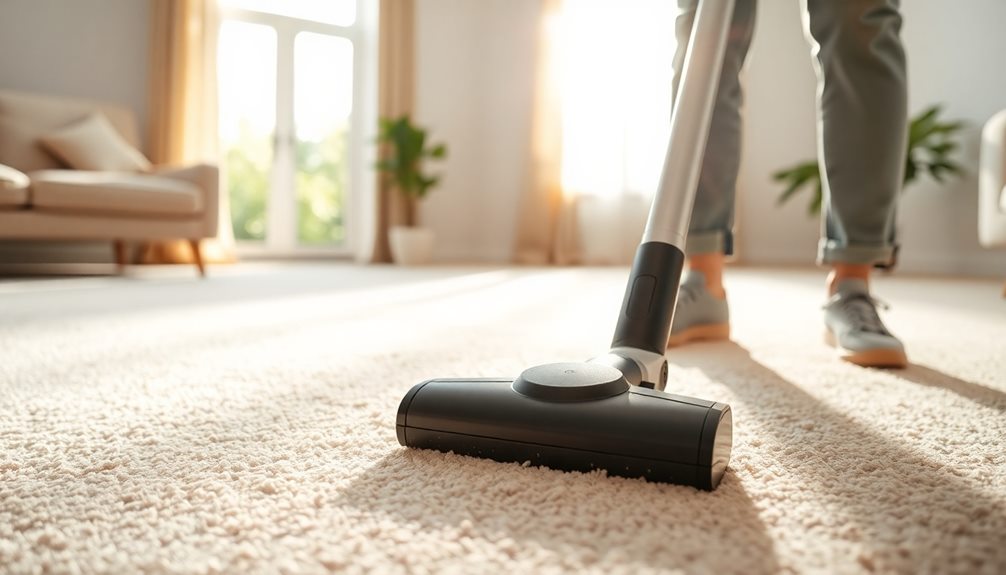To dispose of your vacuum cleaner responsibly, start by checking local recycling centers that accept e-waste; most components can be recycled. You can also consider donating a working vacuum to a local charity or thrift store to help those in need. If you're feeling creative, upcycle parts into unique planters or art projects. Remember to disconnect it from power, remove attachments, and empty the dust canister before disposal. It's important to identify hazardous materials, like batteries, for proper handling. There are plenty of options to explore further, ensuring you choose the best method for disposal.
Key Takeaways
- Check local recycling centers for vacuum cleaner acceptance and guidelines, as many accept them as e-waste.
- Consider donating functional vacuums to charities or thrift stores to promote sustainability and community support.
- Explore manufacturer trade-in or recycling programs for responsible disposal options, such as those offered by eufy.
- Remove attachments, empty dust canisters, and clean filters before recycling to ensure compliance with recycling requirements.
- Repurpose vacuum parts creatively for projects, like planters or storage solutions, to minimize waste and encourage upcycling.
Recycling Options for Vacuum Cleaners

When it comes to your vacuum cleaner's disposal, recycling is a smart choice. Many vacuum cleaners contain filters, such as HEPA filters, that can be recycled or disposed of properly to minimize environmental impact. You can recycle vacuum cleaners through local recycling centers that accept them as e-waste. About 90% of a vacuum's components, including metal and plastic, are recyclable.
To verify proper disposal, check if your vacuum's manufacturer offers recycling programs or Trade-In options. Brands like eufy allow you to return old vacuums for safe recycling.
Before you dispose of your vacuum, remember to disconnect it from the power source, remove all attachments, and clean out the dust canister or bag. This not only makes recycling easier but also increases the chances that those metal and plastic components will be efficiently processed.
Scrap yards can be great places to take your vacuum, as they often repurpose parts, recovering valuable materials and helping to reduce landfill waste.
You can find local recycling events for electronic waste, including vacuum cleaners, through online resources or your municipal waste management program. By choosing to recycle, you're making an environmentally friendly decision that contributes to a more sustainable future.
Donation and Resale Opportunities
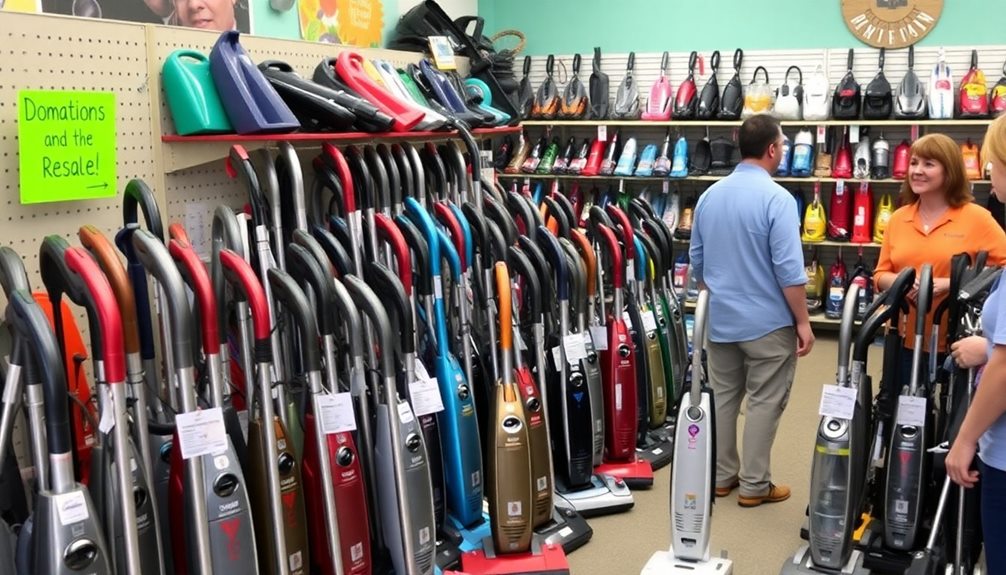
If you've got a functional vacuum cleaner you no longer need, consider donating it to local charities or thrift stores.
Many organizations, like Goodwill and the Salvation Army, are enthusiastic to accept these appliances and help those in need.
You can also explore online marketplaces to sell your vacuum, giving it a new life while making some extra cash.
Charitable Organizations Accepting Donations
Donating your old vacuum cleaner can make a real difference in your community while promoting sustainability. Many charitable organizations welcome donations of functional vacuum cleaners, helping to meet community needs and reduce landfill waste.
By donating, you're not just giving away an item; you're supporting a cause. Additionally, while maneuvering life shifts such as divorce can be financially challenging, successful co-parenting tips can help ease the emotional burden of such changes.
Here are some organizations that typically accept vacuum cleaner donations:
- Goodwill: Accepts working vacuums to sell in their stores, supporting job training programs.
- Salvation Army: Collects donations to fund rehabilitation centers and community services.
- Habitat for Humanity ReStores: Sells donated items at discounted prices, funding affordable housing projects.
- Local Thrift Stores: Often welcome vacuum cleaners, providing essential household items to those in need.
- Shelters: May accept vacuums to help create comfortable living environments for residents.
Online Marketplace Resale Options
Many people find that online marketplaces offer great opportunities for selling or giving away their old vacuum cleaners. Platforms like Craigslist and eBay allow you to reach a wider audience for your functional vacuum cleaners, potentially earning extra cash in the process.
When listing your vacuum for sale, consider the following tips:
| Platform | Selling Tips | Donation Options |
|---|---|---|
| Craigslist | Include high-quality photos | Local charities |
| eBay | Write detailed descriptions | Thrift stores |
| Local Groups | Join buy/sell/trade sections | Community shelters |
You can also donate working vacuums to local charities, thrift stores, or shelters. This not only helps those in need but promotes sustainability by extending the product's life. Websites like Freecycle make it easy to give away items for free, connecting you with individuals in your community who might benefit from a usable vacuum.
Scrap and Parts Recycling
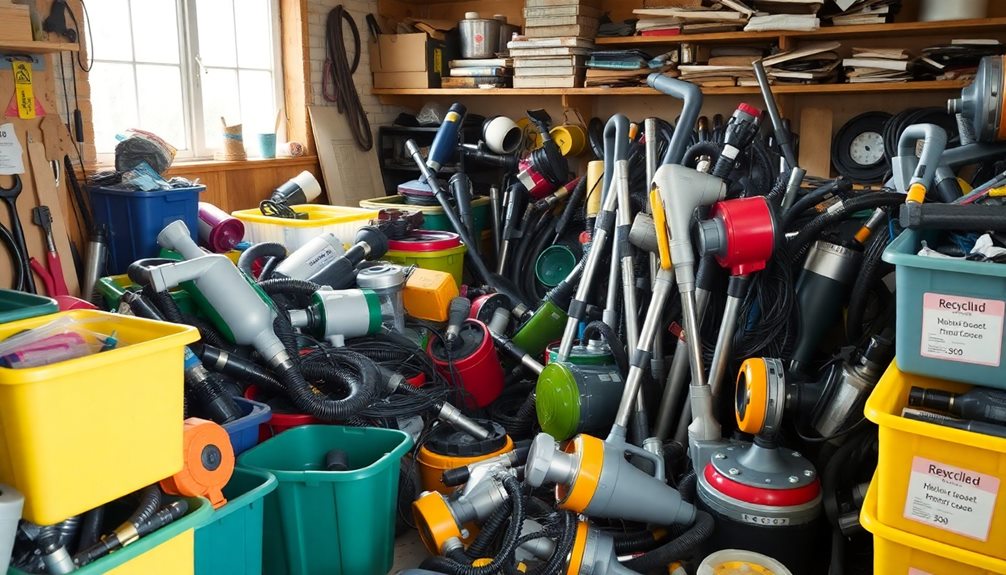
When it comes to recycling your vacuum cleaner, scrap yards are a great option for turning it into valuable materials.
You can also take apart the vacuum to recycle individual components like motors and hoses, making the process smoother.
Scrap Yard Options
If you're looking for an eco-friendly way to dispose of your old vacuum cleaner, scrap yards offer an excellent option for recycling. These facilities focus on recovering valuable materials while reducing landfill waste and environmental damage.
By choosing to recycle your vacuum cleaner at a scrap yard, you contribute to waste management efforts and help in reducing e-waste.
Here are some benefits of using scrap yards for vacuum disposal:
- Recover valuable metals and plastics
- Properly dispose of hazardous materials
- Easily accessible, often located near industrial areas
- Potential for financial return on significant metal parts
- Enhance the recycling process by disassembling prior to drop-off
When you take your vacuum to a scrap yard, they can recycle metal parts and electronic components efficiently, which aids in the recycling process.
If you disassemble your vacuum beforehand, you'll streamline the separation of recyclable materials. This way, you guarantee that as much of your old vacuum is repurposed as possible.
Disassembly for Parts
Disassembling your vacuum cleaner not only makes recycling easier but also allows you to salvage valuable parts for reuse. By carefully taking apart your vacuum, you can separate its various components, like metal, plastic, and electronic parts, making them more suitable for recycling.
With about 90% of vacuum cleaners' components being recyclable, you'll find motors, hoses, and outer casings that can all contribute to the recycling industry.
To start, grab appropriate tools like screwdrivers and pliers to disassemble the vacuum safely. Be cautious with electronic parts, as they may contain hazardous materials requiring proper disposal methods.
Documenting your disassembly process helps you track reusable parts and guarantees that you follow local regulations for recycling or disposal.
Once you've disassembled the vacuum, sort the components into categories: recyclable materials, reusable parts, and hazardous items. This organized approach not only simplifies the recycling process but also maximizes the benefits of your efforts.
Preparation for Recycling
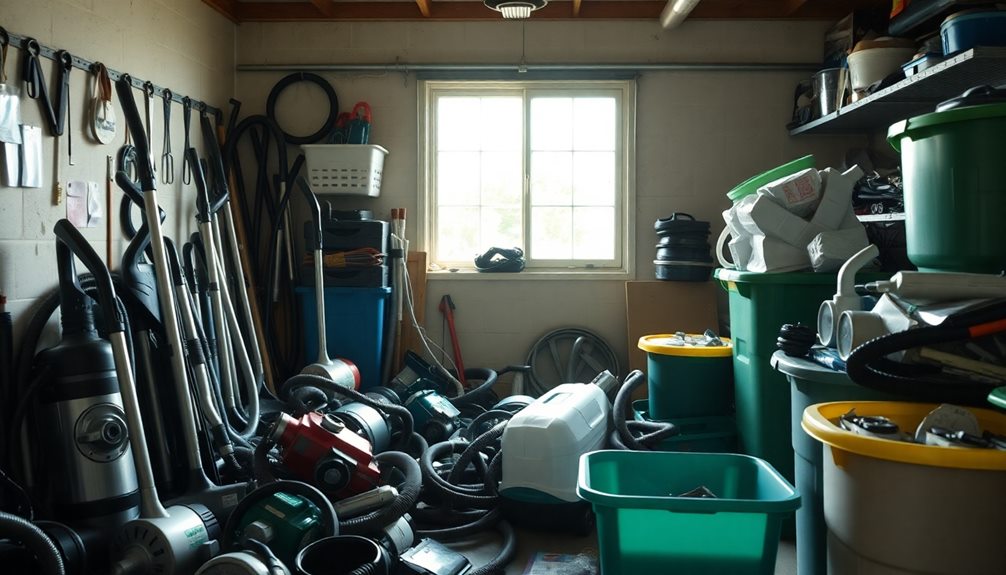
Before you recycle your vacuum cleaner, it's important to prepare it properly to guarantee a smooth process.
Start by verifying it's completely disconnected from the power source to avoid any electrical hazards.
Once you're safe, remove all attachments and accessories, including hoses, filters, and bags, as these often require separate disposal methods.
Here's a checklist to help with your preparation:
- Disconnect the vacuum from the power source to prevent electrical hazards.
- Remove all attachments and accessories that may need different recycling processes.
- Empty the dust canister or bag to avoid contaminating recyclable materials.
- Clean the filters thoroughly to make sure they're free of debris, as many recycling centers require this for proper recyclability.
- Check for hazardous materials, such as batteries, and dispose of them according to local regulations.
Creative Upcycling Ideas

Upcycling your old vacuum cleaner can release your creativity while giving new life to materials that might otherwise end up in a landfill. One fun idea is to transform the vacuum cleaner body into a unique planter. Simply cut the top off, fill it with soil and plants, and you've created a decorative garden piece.
You can also repurpose the vacuum's hoses for various DIY projects. Use them as flexible tubing for crafts or turn them into homemade pet toys to enrich your furry friends' lives.
The wheels from the vacuum can be utilized to construct mobile furniture or storage units, enhancing functionality while reducing waste.
Another innovative idea is to convert the vacuum cleaner's filter into an air purifier or a dust trap for your DIY projects. This effectively reuses materials that might otherwise be discarded.
Finally, smaller parts like motor components or brushes can be crafted into imaginative pet toys, showcasing your creative side while promoting upcycling.
These projects not only help the environment but also let you express your creativity and resourcefulness. So, roll up your sleeves and start your upcycling journey today!
Environmental Regulations and Impact

When it comes to disposing of vacuum cleaners, understanding environmental regulations is fundamental. Improper disposal can lead to significant environmental pollution and regulatory issues. The Resource Conservation and Recovery Act (RCRA) governs how you should handle hazardous waste, including vacuum components.
Violating these regulations can hit you with hefty fines, so it's imperative to dispose of your vacuum responsibly.
Consider these points:
- E-waste from vacuums contributes to 70% of toxic heavy metals in landfills.
- Toxic fumes released from improper disposal can harm air quality.
- Local recycling centers often accept vacuums to guarantee safe recycling.
- Resource conservation is essential to prevent unnecessary waste.
- Being environmentally responsible helps protect your community's health.
Safe Disposal Practices
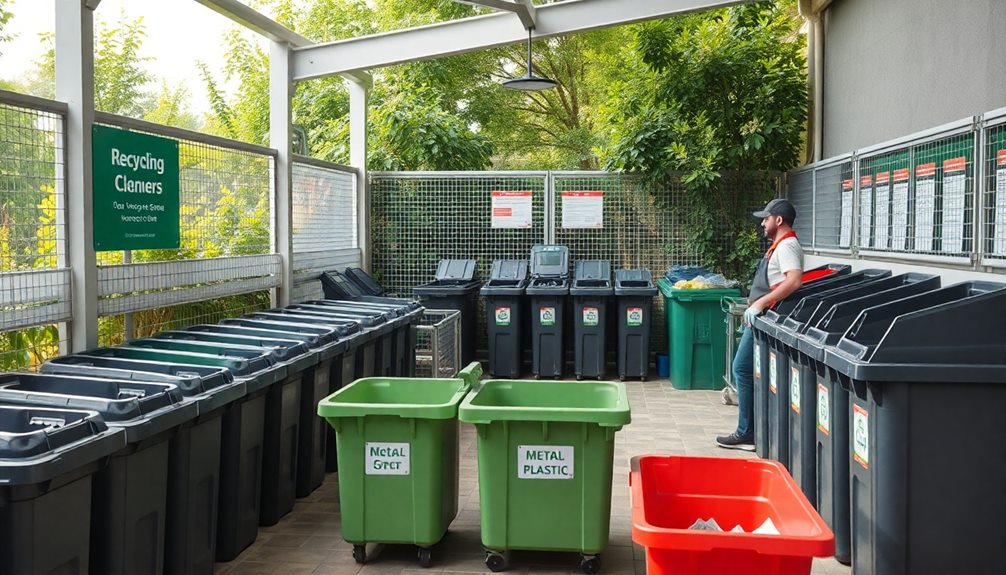
Disconnect your vacuum cleaner from the power source and start prepping it for disposal by removing all attachments, dust canisters, and bags. This step is essential for safe disposal practices.
When you decide to dispose of your vacuum cleaner, consider recycling your vacuum cleaner at local recycling centers that accept electronic waste. These centers can recycle about 90% of the components, including metals and plastics, greatly reducing landfill waste.
Before you recycle, check for any hazardous materials, like batteries, that may require special handling according to local regulations.
If your vacuum cleaner is still functional, don't forget about donating it to charities, shelters, or thrift stores. This not only extends its life but also benefits those in need while minimizing waste.
You can also explore manufacturer trade-in programs or retailer initiatives, such as those from Best Buy, for proper disposal options. They often have recycling programs designed to guarantee your old vacuum is recycled responsibly.
Frequently Asked Questions
How Do I Get Rid of My Vacuum Cleaner?
To get rid of your vacuum cleaner, consider recycling it at an e-waste center, donating it if it works, or selling it online. Always remove attachments and check for hazardous components before disposal.
What Do I Do With My Old Dyson Vacuum?
You can trade in your old Dyson vacuum through their program for recycling and discounts on new purchases. Alternatively, check with local recycling centers to verify proper disposal and maximize sustainability.
Are Vacuum Cleaners Considered Electronics?
When it comes to your trusty vacuum cleaner, you're dealing with more than just a household helper; it's considered electronic waste. So yes, vacuum cleaners are indeed classified as electronics, requiring special care during disposal.
Can I Throw Away a Vacuum Cleaner in NYC?
No, you can't just throw away a vacuum cleaner in NYC. It's classified as e-waste, so you need to drop it off at designated recycling events or participating retailers for responsible disposal.
Conclusion
When it comes to disposing of your vacuum cleaner, remember that every little action counts, much like the butterfly effect in chaos theory. By exploring recycling options, donating, or even upcycling, you can give your old appliance a second life while reducing waste. Don't just toss it aside; embrace the chance to make a positive impact on our planet. After all, just like every vacuum collects dust, your choices can gather hope for a cleaner, greener future.


